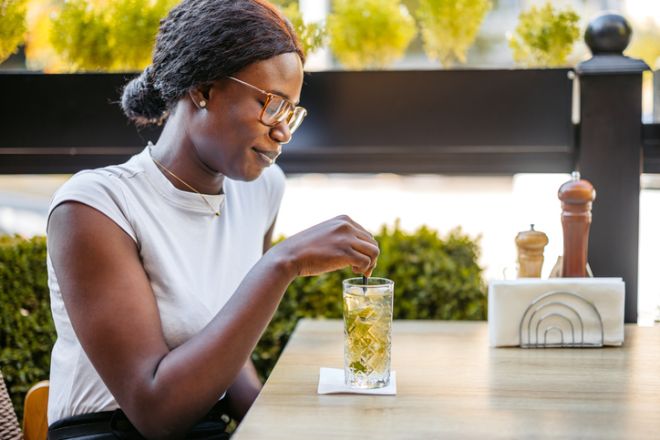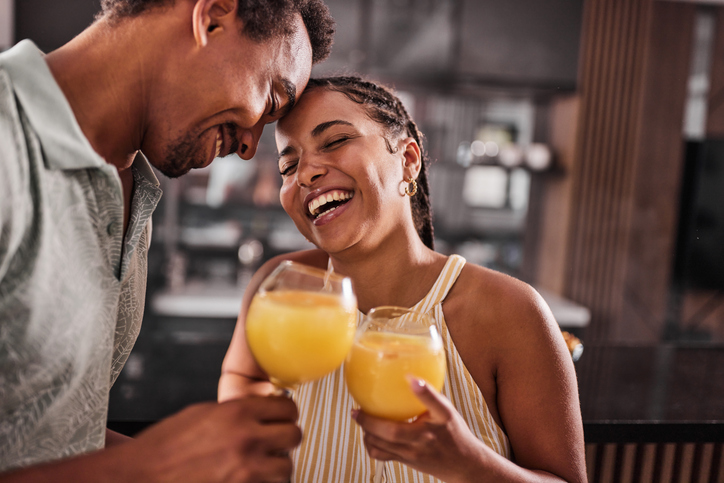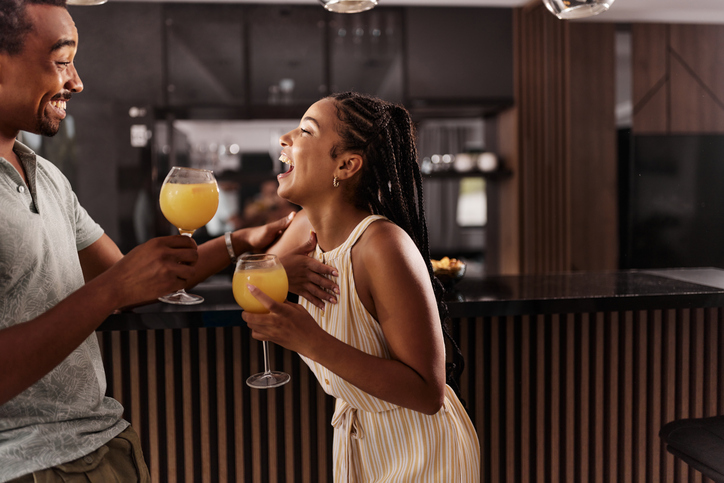Sober bars are a sexy option for women looking to ditch alcohol
7 Sexy Black-Owned Sober Bars For Ladies Looking To Ditch Alcohol
Share the post
Share this link via
Or copy link

Source: urbazon / Getty
It’s Sober October and in a world where drinking is often seen as a social norm, sober bars are revolutionizing the way we connect, offering a welcoming alternative for those seeking community without the pressure to consume alcohol. These unique venues provide a diverse array of non-alcoholic beverages and host activities designed to foster meaningful connections, making them a vital resource for individuals navigating recovery and those committed to healthier lifestyles.
During the COVID-19 pandemic, studies revealed an increase in alcohol and drug use, with the Centers for Disease Control and Prevention (CDC) reporting that 13% of Americans began or increased substance use as a way to cope with stress. For those like me who have struggled with alcoholism, these statistics hit close to home. Since my mid-twenties, I have been in recovery. On November 27, 1994, I took my last drink. After a decade of heavy drinking, I finally accepted that I could no longer drink safely. Alcohol didn’t bring laughter or freedom; it only led to out-of-control behavior and overwhelming shame, guilt, and anxiety. With help from a recovery program for people seeking to stop drinking, I’ve lived nearly three decades without a drink.
Over the years, I learned that sobriety is much more than just abstaining from substances. It’s also about healing the trauma and emotional pain that drove me to drink, as well as learning how to face life without resorting to self-destructive behaviors. In the early days, my focus was on resisting the temptation to drink and building a new life that didn’t revolve around alcohol.

Source: skynesher / Getty
Love MadameNoire? Get more! Join the MadameNoire Newsletter
We care about your data. See our privacy policy.
A common piece of advice given to those in early recovery (less than one year of abstinence from drugs or alcohol) is to stay away from the “people, places, and things” associated with past use. This is easier said than done. Creating a lifestyle and building friendships takes time where drinking isn’t central to our social interactions. This is where a new type of establishment—the sober bar—can support a person’s efforts to abstain from alcohol.
Sober bars mimic traditional bars—whether chic or casual—but without alcohol. They offer a wide range of non-alcoholic beverages, from creative mocktails to specialty coffees, all served in an environment without an expectation to drink. For a newly sober person struggling to resist the allure of alcohol, a sober bar can make the transition to a life free from mind-altering substances feel less jarring.
Sober bars can particularly appeal to young women seeking a supportive and inclusive space to connect with others. To help ease the awkwardness some may feel when socializing without a drink, activities such as open mic nights, wellness workshops, and themed gatherings can alleviate some of the social anxiety associated with early recovery.

Source: skynesher / Getty
“Sober bars are part of the harm reduction response to recovery,” explained Lainey W., a Recovery Support Peer Specialist working with marginalized communities in Central Texas to MadameNoire. “When someone visits a sober bar instead of a traditional drinking establishment, it reduces harm to them, their body, and their relationships.
It also helps diminish harm to society by lowering the number of ER visits, drunk driving incidents, arrests, and other consequences of alcohol use.”Sober bars aren’t exclusively for people with a history of substance abuse or alcoholism; they attract a wide range of individuals committed to healthy lifestyles and personal growth. This shared mindset helps women build friendships with others who understand their journeys and provide mutual support. In a world where drinking is often seen as a rite of passage, sober bars empower women to socialize on their own terms, free from the pressure to drink.
Recovery involves healing wounds in our bodies, minds, and spirits and learning new ways to process our emotions, often requiring lifestyle changes like quitting drinking, exercising, joining support communities, and addressing mental health issues. As more people embrace terms like “sobriety,” “trauma,” and “recovery,” sober bars can be a collective space of joy and healing.
Want to see what the buzz is all about? Here are Black-owned sober options:
1. Sober Bar Babe (N Rampart St, St Ann St., New Orleans, LA 70119)
Owner Rhadell Green has been a pioneer in the sober bar scene since 2018, serving a diverse menu of non-alcoholic drinks, sno-balls, and locally made snacks at this mobile location in New Orleans.
2. Sober Social (141 Mangum St SW unit 207, Atlanta, GA 30313)
A trendy non-alcoholic cocktail and kava bar with activities like karaoke and trivia night.
3. HoneyBee Sage Wellness (1819 N Doctor M.L.K. Jr Dr, Milwaukee, WI 53212)
An herbal apothecary, metaphysical gift shop, tea café, and alcohol-free craft cocktail lounge.
4. Zero Cocktail Bar (223 Carlton St., Toronto, ON M5A 2L2, Canada)
Canada’s first non-alcoholic cocktail bar, tasting room, and bottle shop is Black woman owned and making waves on the international sober bar community.
5. Sans Bar (918 Congress Ave., Austin, TX 78701)
Texas’ first sober bar, Black-owned and operated by an addictions counselor.
6. Gem Bar (5 S Broadway, Pitman, NJ 08071)
A booze-free bottle shop and pop-up bar featured in Forbes and Vogue.
7. DreamHouse Lounge (401 Baronne St Suite 101, New Orleans, LA 70112)
An oxygen and wellness lounge serving zero-proof cocktails, with some THC-infused beverages available.
RELATED CONTENT: Blac Chyna Cries Happy Tears Celebrating 1st Year Of Sobriety With Tokyo Toni On The ‘Tamron Hall Show’
-

Meet Dominique Fils-Aimé, The Haitian-Canadian Star Redefining Jazz For A New Generation: ‘This is My Vision' [Exclusive]
-

Cooking With Purpose — How Brittney Williams Honors Her Caribbean Roots Through Food
-

9 Famous Lesbian Women Who Were Married To Men
-

Bucket Baddies With Big Energy — The 30 Hottest NBA Players In The Game Right Now








